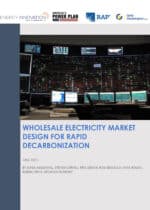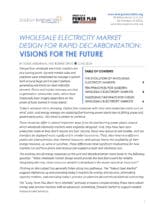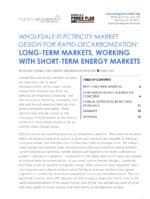Competitive wholesale electricity markets are at a turning point. The fact that clean energy is increasingly the cheapest option for the electricity grid leads to the following question: “What wholesale market design would provide the best framework for reliably integrating clean resources to decarbonize the power system at least cost?” These papers outline questions emerging about wholesale market reform and introduce two pathways for markets to evolve.
Wholesale Electricity Market Design for Rapid Decarbonization
Current wholesale market rules and practices were built to manage a system where large central power plants supply inflexible consumer demand. But today’s resource mix is changing as carbon-free resources replace fossil fuel-burning power plants, raising the following question: “What wholesale market design would provide the best framework for reliably integrating clean resources to decarbonize the power system at least cost?”
This summary paper includes all three individual papers, outlines underlying questions about wholesale market reform, and introduces two pathways for markets to evolve.
Visions for the Future
Competitive wholesale electricity markets are at a turning point. Current wholesale market rules and practices were built to manage a system where large central power plants supply inflexible consumer demand. But today’s resource mix is changing as cheap, smaller, carbon-free resources replace expensive, large fossil fuel-burning power plants. The differences between these resources have significant implications for how markets operate and how prices and revenue can support a least-cost electricity mix. This paper outlines underlying questions emerging about wholesale market reform and introduces two alternative pathways for markets to evolve.
A Decentralized Markets Approach
This paper proposes a continuation of today’s energy markets coupled with more robust bilateral contracting as a solution to the challenge facing competitive wholesale electricity markets. In it, the authors suggest a market structure with a central spot market and active decentralized forward procurement between wholesale buyers and sellers through bilateral contracting will generate sufficient investment to achieve resource adequacy, and in combination with well-designed low-carbon investment policy, will facilitate rapid decarbonization at the lowest reasonable cost to consumers.
Long-Term Markets, Working With Short-Term Energy Markets
This paper proposes a hybrid solution to the challenge facing competitive wholesale electricity markets. In it, the authors propose adding long-term markets to today’s short-term spot markets to support investment in zero-carbon resources, along with complementary clean energy technologies to reliably decarbonize the power system at least cost to consumers.




